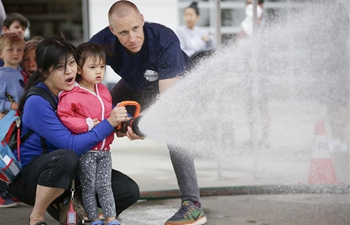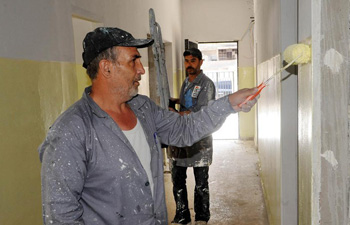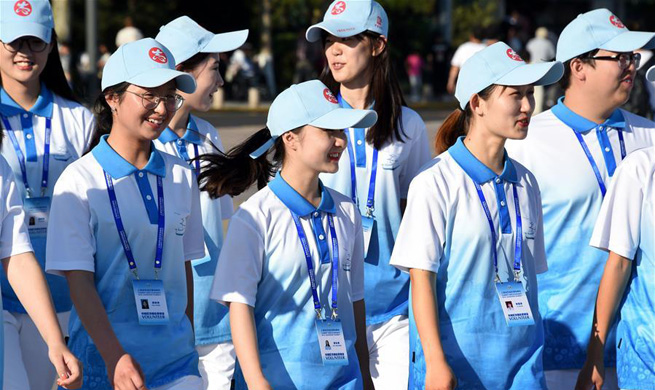By Li Ying, Li Yue
LOS ANGELES, June 3 (Xinhua) -- Seven-year-old Aviendha Wang returned from the 2018 Los Angeles International Wushu (Chinese Kung-Fu) Tournament last week with two gold medals in fencing and boxing.
In that competition, Aviendha was one of the 37 kids from Wushu Unlimited, a school founded by her parents Wei Wang and Jennifer Wang. Wushu Unlimited has around 120 students, one of the largest across Los Angeles.
About one third of them are Chinese. Wei Wang has been working on simplified Wushu for 15 years since the first time he arrived in the United States.
"Chinese Wushu is incomparable with other martial arts because it has so many styles and patterns. This makes it very exciting but on the other side, it creates more barriers to reaching a broader audience here," Wang says.
Aviendha does the Wushu movements to the rhythm of martial arts music in her class. Completing a standard form her coach assigned, her piercing eyes also illustrate the quotes hanging on the wall: "vigor, energy, spirit," an English translation of the Chinese Wushu spirit. "I planned to start this
school in 2015, but it was moved forward to 2013. Because at that time I was performing all over the world, I missed a lot of moments with my daughter, and she grew up so fast," Wang says.
Wang was a Wushu champion in China when he was young. "Half of the reason I established Wushu Unlimited is because of my daughter. I also wanted to make a difference and spread Chinese Wushu culture in the US," the 43-year-old coach said.
Like many other fathers, Wang feels he should be even stricter with his daughter but it is hard for him to do that. "Learning Wushu is pretty hard and tiring, and I do not want to push her too much. But as part of the Chinese traditional sports, I think she has to at least be aware of it and learn something about that," Wang said.
"She and her daddy have this very strong bond. They train together, and they play together," Jennifer Wang says. "She knows how to distinguish between her coach and her father."
Soaking up this atmosphere every day after school, Wushu is so riveting to Aviendha, and she does not think this sport is as daunting as it once was. "It is not that hard anymore. It is pretty easy," Aviendha says. "I like the weapons, all the cool forms, and the fun games."
She even set herself the goal of winning first place in the Texas competition so that she can be selected for the US National Team.
The Texas competition is the biennial Wushu national team trials organized by the United States of America Wushu Kungfu Federation (USAWKF), which was held in Texas this year.
Aviendha took part in this year's competition in the 7-11 age-group category. She didn't win but she performed very well, Wang told Xinhua.
The Chinese champion father and his wife Jennifer have a bigger dream beyond their daughter's gold medals. Growing up in San Marino, California, where more than half of the population is Chinese has been always interested in Kung fu movies, which even took her far from her home to China several years ago.
From her perspective, she understands the core of Chinese culture as "balance". With the background in education and experiences both in America and China, she tries to put the emphasis on "being well balanced" both academically and physically at their school.
But teaching Wushu in China and here is quite different. "Here it is a hobby. If people find it is boring, they would leave, whereas in China people may spend six months only do kicking," Jennifer says. "Wushu itself has to change in America, to be adaptable, so that people would stay interested."
Wang agrees with his wife. He said the way he learned Wushu at his daughter's age is totally different from how his daughter learns today. For him, there were not many options. Based on the different cultural background and education methods, he thinks it is important to have the combination of both Wushu's form and practical application.
"One of the most beautiful times we have now is every time Jennifer and I talk about the future of our school," Wei Wang said. "Although we sometimes have different opinions, it is a communication between the two different cultures, and we have the same goal to achieve."

















